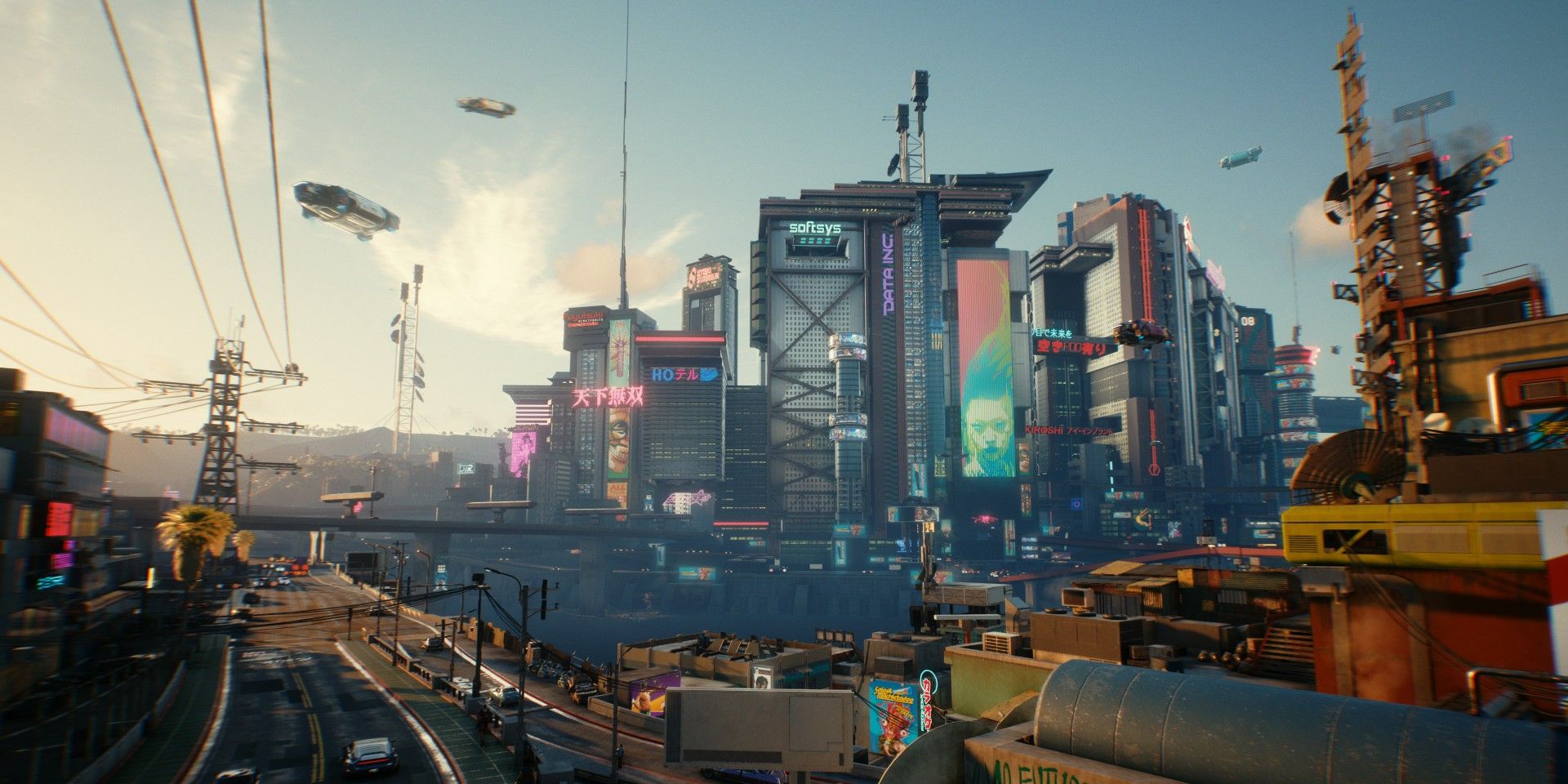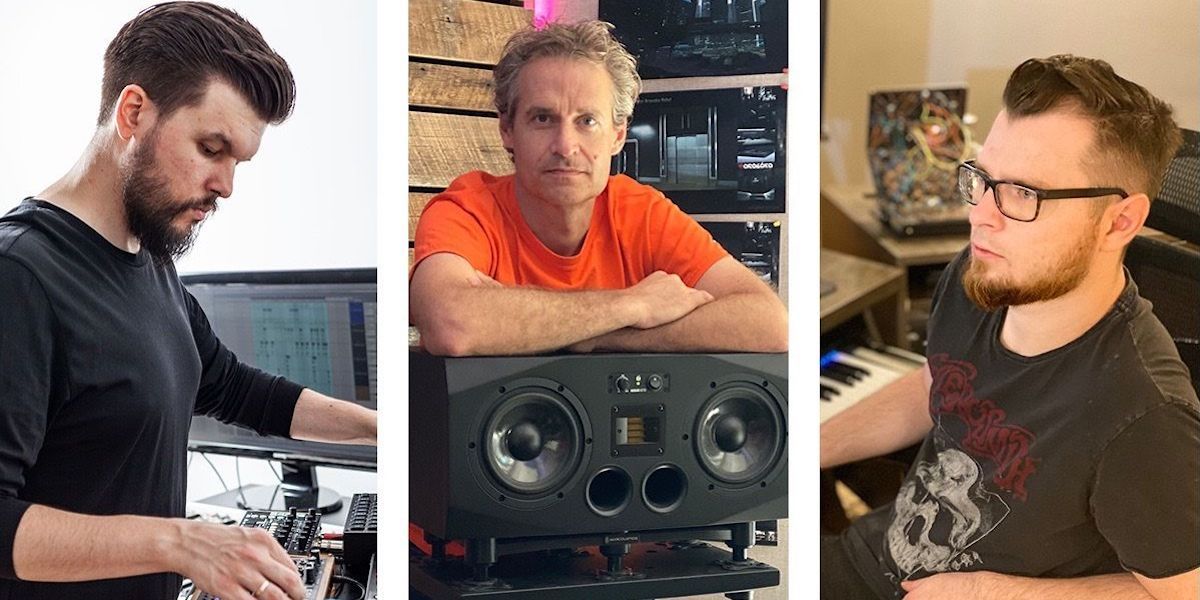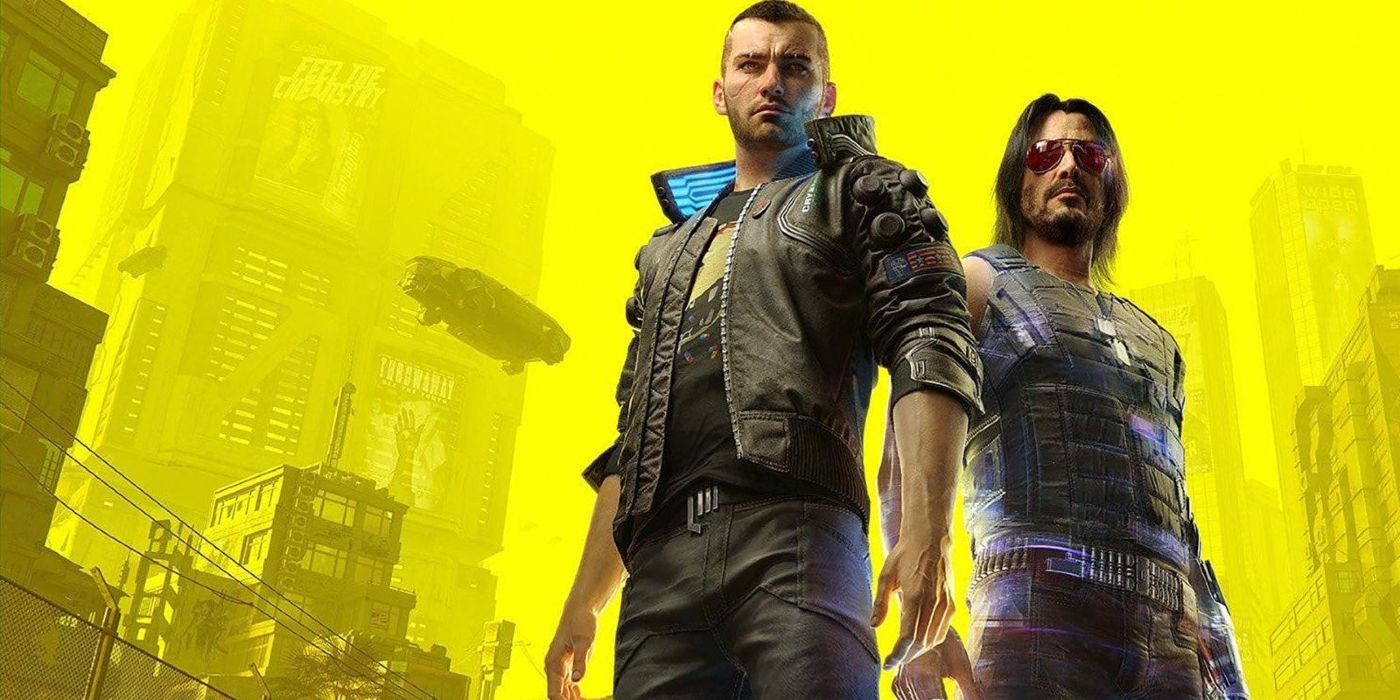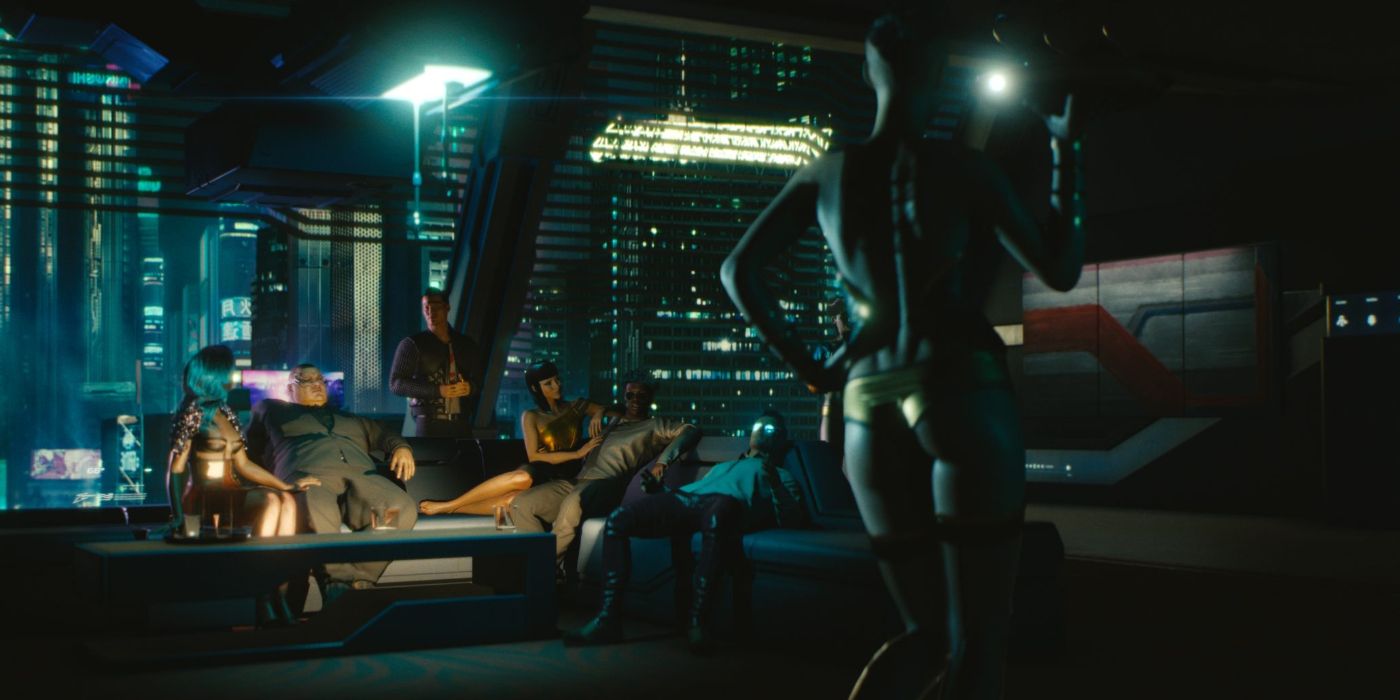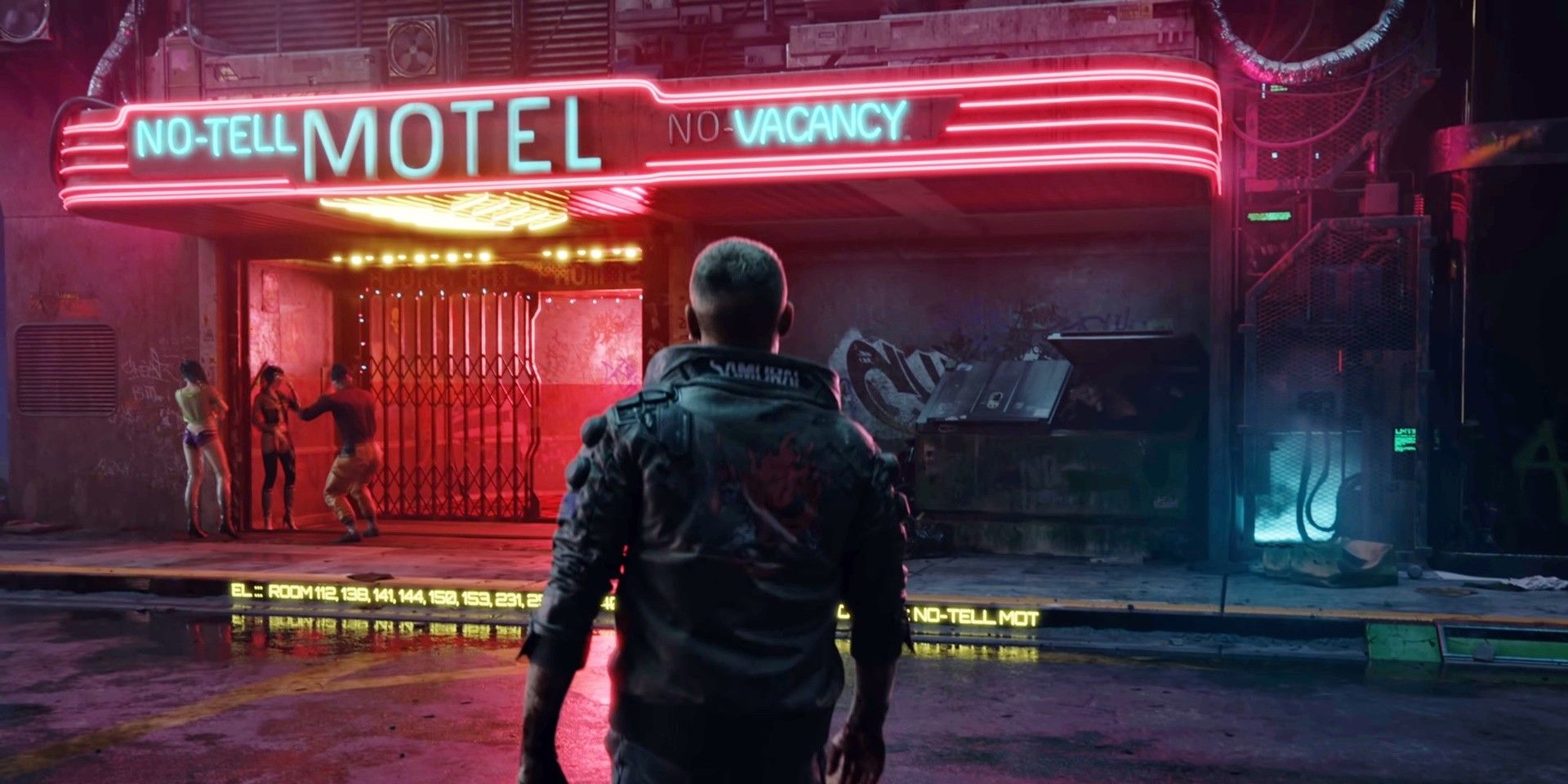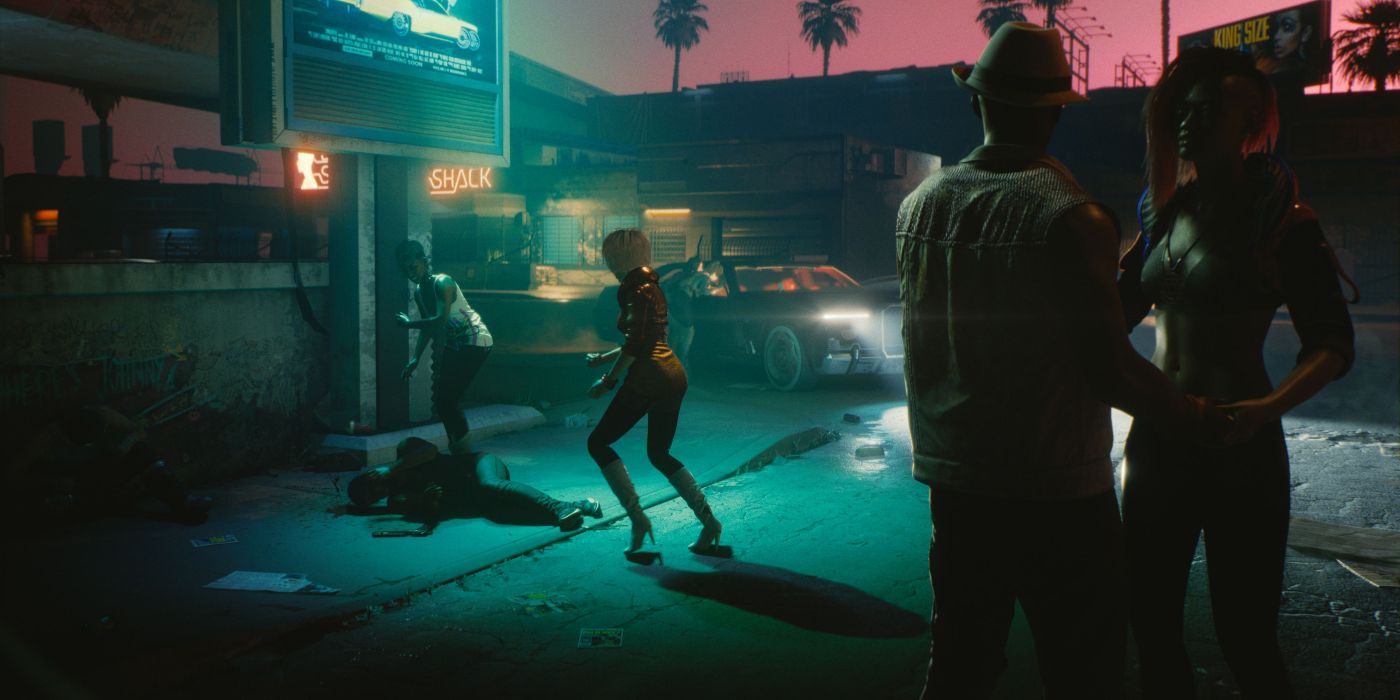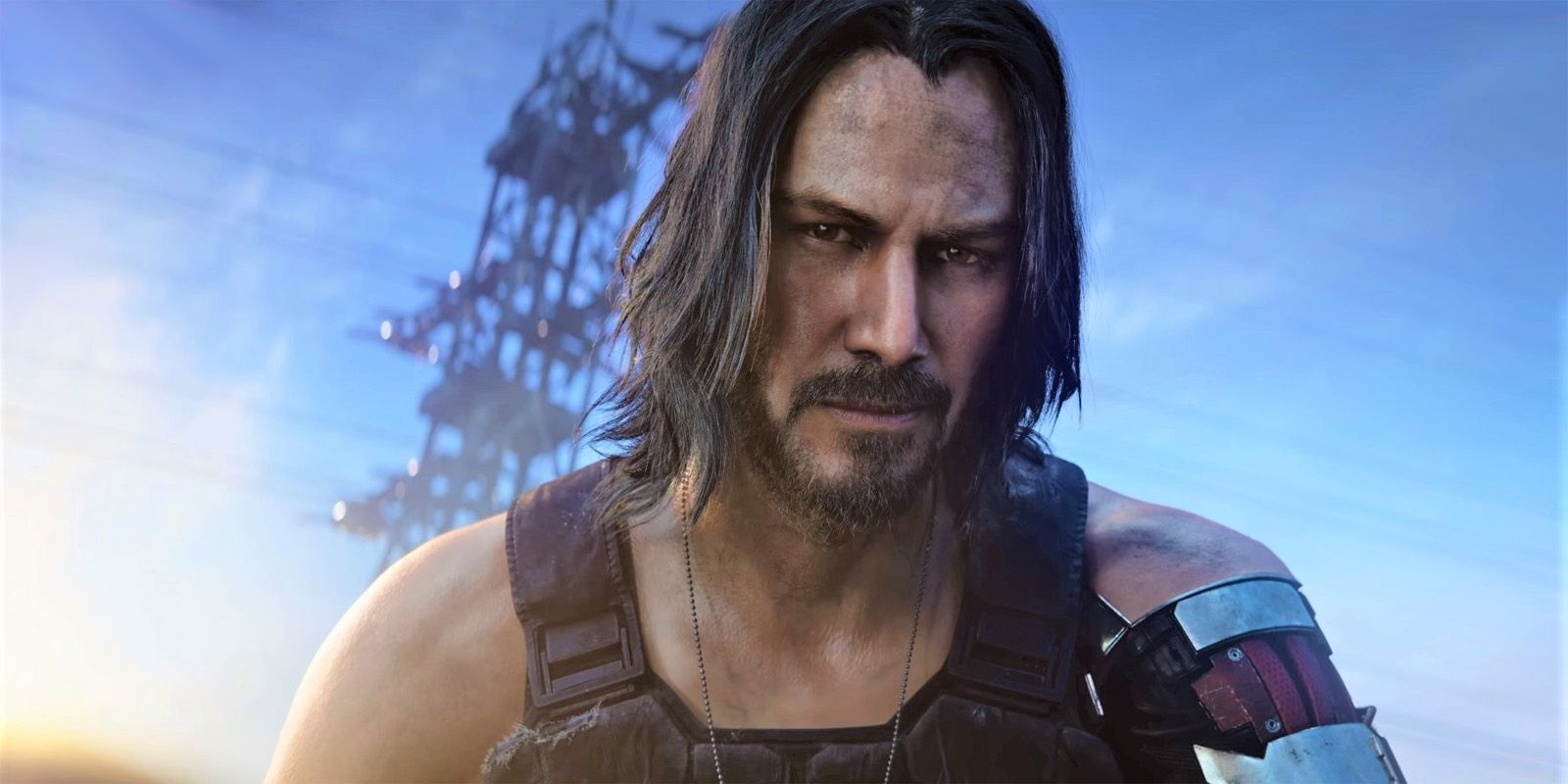After years of development and numerous delays, the eagerly-anticipated Cyberpunk 2077 is rapidly approaching its December 10 release date. CD Projekt Red, the studio behind universally-acclaimed titles like The Witcher 3: Wild Hunt, is back with a brand new sprawling RPG focused on player choice, immersive role-playing, and tremendous production values unprecedented for an adventure of this size. Set in the neon noir-tinged dystopian metropolis, Night City, Cyberpunk 2077 follows the fully-customizable player character, V, as they embark on an odyssey through all the crime, corruption, glitz, and glamour the big city has to offer.
The sprawling musical tapestry of Cyberpunk 2077 is largely the product of three men: Marcin Przybyłowicz (The Witcher 2 and 3), P.T. Adamczyk (Gwent, Thronebreaker), and Paul Leonard-Morgan (Dredd, Battlefield: Hardline). The three composers worked together to create a soundscape that reflects the highs and lows of society in Night City, with help from guest musicians like Nine Inch Nails' Ilan Rubin on drums and Tino Guo on electric cello.
While promoting the upcoming release of Cyberpunk 2077, composers Marcin Przybyłowicz and Paul Leonard-Morgan spoke to Screen Rant about their work on the game. They discuss what makes Cyberpunk 2077 different from other works in the genre, and how they collaborated to craft a wholly unique musical language for the game. They talk about how the composing process was more than just writing pieces and getting people to play them, and dive deep into their love of modular synths and their lofty ambitions of creating sounds that nobody has ever heard before.
Cyberpunk 2077 releases December 10 on PlayStation, Xbox, and PC.
I see Cyberpunk, the title, is a statement. It's this ubiquitous genre and setting, and the tabletop game has been carrying that torch for years. Is your music an all-encompassing celebration of that word, Cyberpunk, or is it more specific than that?
Marcin Przybyłowicz: To my understanding, Cyberpunk is a very flexible term, especially when you look at the movies and video games that are attached to that style. The Matrix, Blade Runner, Deus Ex, Akira, Ghost in the Shell... They all explore Cyberpunk themes, but in different ways. That's what I like to think about our take. It's our Cyberpunk. It's not any other Cyberpunk project, it's Cyberpunk 2077. It's based on the pen and paper RPG made by Mike Pondsmith, which means it's a very well described, established, and lore-specific place. Our music had to address that.
Paul, this is your first collaboration with CDPR, right?
Paul Leonard-Morgan: It is, indeed, those crazy fools!
Can you talk a bit about building a rapport, about trading notes, and about how you learned to mesh, musically?
Paul Leonard-Morgan: As Marcin said, Cyberpunk is such a huge thing. I scored the Dredd soundtrack, which is, I guess, was first touch of the Cyberpunk world. But growing up with Akira and all these wonderful things... I also think of Mad Max, even, as Cyberpunk. I know, some people say, "That not Cyberpunk, it's just dystopian!" But then we come to the present time. When I started discussing with P.T. Adamczyk and Marcin and CDPR about how this would work... I mean, we have three composers here, we all have different styles, how are we going to make it so there's a cohesiveness to the score? I said, look, I'm good at my synths, I'm good at this, I'm good at that. Marcin is good at certain things, and P.T. is good at certain things. So we really just started playing. We experimented for the best part of six months to a year, just coming up with sounds. We were sending stuff to each other, across different time zones. It was just a lovely, experimental process for the first six months, trying to work out what sound we really wanted to have for the game. Once you find that sound, it makes it so easy to go in there and go, "Now we're nailing this." Everyone's got different parts of the game we're all working on, but there's a cohesiveness. It's got "a sound" that I don't think I've ever heard in a video game before. It's so fresh. It's got such attitude. It just took those six months or so to get there, to get a common language between us, as composers.
You've got live drums on top of these electronic loops and riffs. Did you perform everything yourself, or did you get some outside help?
Marcin Przybyłowicz:We had Ilan Rubin from Nine Inch Nails. That brings a certain quality aspect to the table, and a certain attitude with the grooving on drums. Ilan was our first and only choice. If he had said "no," we would have had to come up with a completely different idea. It was the only way we could have done it the way we wanted.
Paul Leonard-Morgan: Ilan's drumming was absolutely mind-boggling. I wasn't there for that session, but... We had so many different riffs and BPMs (beats per minute). So we had the various BPMs of the soundtrack at certain points, and then he played different loops and different fills, and so on. Then it was about a three-day process, having them all chopped up, and then all three of us had access to what was almost like a great big sample library that we could use. Again, we're so different in our methods of writing, so we treat and process these sounds in many different ways, like smashing them through distortion, or reverse them, or use them in certain ways so you can't even tell they're drums. But as you say, Marcin, there's such an attitude with Ilan's playing. He just smashed the s*** out of those skins. It was absolutely fantastic. And he's so tight. This is the thing I found amazing through this whole process: there's so many synths on the soundtrack, and so the drums, bizarrely enough, add the humanity to it. You've got the electronica going, and the drums, a lot of the time, any other drummer would be slightly out and it would sound weird. But he was absolutely on the beat. So you've got these electronic beats with his real beats processed over the top, and they just fit beautifully.
Marcin Przybyłowicz: What's interesting about our process is, when you work on a score for a game or a movie or whatever, the natural order is that you work on the music, produce sheet music, mock-ups, whatever, and then go to the studio to record that stuff. Because of the nature of this Cyberpunk music, and how deeply and how much we have processed these sounds, we did it the other way around. We first started with recording sessions. We had to come up with some rudimentary boundaries, as I would call them, in terms of themes, tempo, pacing, whatever. A common foundation between the three of us. And then we went to the studio, as a first step of this whole creative process. And the same with Tina Guo, actually, the electric cellist. We did have some melodies already done. We could have proposed her with written sheet music and have her play stuff for us, but what I like the most about recording sessions in general when working with people of that talent and skill is that you invite them to basically jam together, to improvise on your stuff. That's where the real magic happens. Obviously, we may have our own ideas, visions about how we want to execute specific elements in music, but in the end, it's about this particular musician who would transform our ideas into a living, breathing thing.
Paul Leonard-Morgan: Completely. I think that's the difference, also, with games. I do a lot of film soundtracks, and on film soundtracks, you've got your orchestra. You're at the studio with a big orchestra, and it's great. You say to them, "Here's the horn part, play it." But the thing for me, that always marks a real musician, is they'll go, "I can play it like this, or I can slur it like this, or I can play it with a harmonic, or whatever." Going back to Tina's sessions, I was there, and we were at Sunset Sound, where Prince and The Beach Boys recorded a lot of their stuff... It's like hallowed turf! Tina's in there, doing this crazy s***, working on Marcin's beautiful tunes, and I'm hearing these tunes for the first time... It's absolutely beautiful. And then then Tina goes, "Okay, you've got it as you wanted it, now let me just do a couple of things..." And she does this mad, electronic distorted delay stuff, and it brings it to life. This soundtrack is so different. As Marcin said, you start with something and then you expand it, but you've already got your structure. What we've done with all our crazy synths... Half of them aren't normal synthesizers. They're mod synths with electronic circuits where you put your finger down to create a circuit and play a noise. You can't write that on a normal computer. You have to record it as audio. P.T. would describe it as a jam session.
Marcin Przybyłowicz: A one-on-one jamming session, yes.
Paul Leonard-Morgan: And then you're recording it and chopping it all up afterwards. It was the same with the drums and with Tina. We had all this material, and then we started propping it up, figuring out what would work on our tracks. Normally on a soundtrack, or even a pop song, you might have 30 or 40 tracks on there... On this stuff, half the time there's seven or eight or maybe nine tracks. Every track is so complicated, that anything more than that is going to take away from the beautiful distortion and electronica that's coming out of it.
I know a lot of artists collaborated for the in-game radio songs, and Refused stands in for Johnny Silverhand's band. Did you work with them on that, or was it a separate thing? I imagine there has to be some kind of synergy, right?
Marcin Przybyłowicz: It's a pity we don't have P.T. on board, because that was entirely his thing. He brought Refused to the table. It was his idea that the singing voice of Johnny Silverhand should be Dennis Lyxzén from Refused, and he was the creative genius behind conceiving this whole samurai concept from the musical perspective. But at the same time, it doesn't mean we had to pay very close attention to how that punk music would fit with our score. Score is one thing, and Refused's tracks are an entirely different thing. They live through the world. They're connected to the storyline. Lore-wise, Johnny Silverhand has been dead for 50 or 60 years or so. That gave us some liberty to go wild with ideas and not care much about cohesive integrity, because it was not supposed to sound integrated.
Right, it's not contemporary.
Paul Leonard-Morgan: If you look at the size and scale of the game, it's so friggin' huge. The soundtrack and the score are hand-in-hand, but it goes back to that word, "attitude." The common unity, what every track in the game has brought, is "balls." It's got attitude, it's got energy, it's got edge. It can be punk guitar, hardcore drums, or the electronica synths, but it's all got the Cyberpunk ethos behind it.
Are there any other musical guests you can share with us?
Marcin Przybyłowicz: A third and equally significant part of our musical talent pool we got to take advantage of with the score is Richard Devine, who designed bespoke sounds, textures, and layers for us. That pretty much sums it up. The nature of the music, and the workflow we chose to follow, meant that most of the work was done with our hands. Especially since you consider that 98% or really close to 100% of the music, excluding the cello and drums, is purely electronic. We can close ourselves in our studios, experiment with our instruments, experiment with other stuff, process sounds, and hopefully come up with something that no one has ever done before. That extends to the gear we used. We started with the standard arsenal, Moogs and Prophets, and other well-known synths... But the real fun for us was hunting for less known, less popular, maybe less obvious choices.
Paul Leonard-Morgan: Not less known. I think they're totally unknown!
Marcin Przybyłowicz: They're obscure. There's some obscure choices, that's a better word. For example, me and P.T. both own a Soviet-made synthesizer called a Polivoks. Mine, in particular, was made in 1982 if I'm not mistaken. It's almost 40 years old, but it still sounds like crazy. It looks ugly, it's made from a cheap plastic, the knobs are hard to work with and they look like they were ripped out of the Chernobyl nuclear reactor or something... So it's nothing elegant or high tech or luxurious about it. But still, it's robust, it works. It's like those Russian Kalashnikovs: they can be 50 years old, and they still work. In the desert, in the snow, in the rain, they still work.
And it's all the original guts?
Marcin Przybyłowicz: Oh yeah, it's 100% genuine, yeah. Mine and P.T.'s. That kind of fills out the vintage area. Then, when it comes to more experimental stuff, it gets even more interesting. There's an old synth that looks like a bare bones box with some cables attached to it. I still have problems understanding how it works.
Paul Leonard-Morgan: (Laughs) I hadn't used it for about a month, and then I took it out and couldn't get the bloody thing to work! They're totally not normal.
Marcin Przybyłowicz: And then manuals are not written that well in English. There are grammar errors and misspellings. Specific features are not described with the depth you would expect. You're basically left alone with your creativity and desire to experiment. That pretty much sums up our process with making up this music, because when you're working with toys like this, you have no idea what the outcome is going to be. You always need to be cautious, you always need to record everything you do. If you're lucky, you'll find good parts throughout that you can pull, mix them up, run it through some guitar effects or whatever, and see what comes next! I think that was my favorite part of the whole job; not being sure what's going to happen.
I'm so glad you mentioned those synth tools, because I feel like a lot of people who aren't musicians assume that all synths are the same. Like, "Hey, why do you have two keyboards?" You know? They don't know!
Paul Leonard-Morgan: On your normal keyboards, they've got individual sounds that you can use for bass or this or that. But the fun part is the experimentation. You can't recreate that sound again. After you make it and record it as audio, it's gone forever.
Marcin Przybyłowicz: It's gone. Yeah.
Paul Leonard-Morgan: ...Mostly because I can't work out where to put in the power cable, but that's a different story. (Laughs) But it's genuinely gone forever, yes. So many people ask about what direction we've gone in for the soundtrack, "is it Blade Runner? Is it this? Is it that?" And we've always said, we don't want to do something that people have done before. There's no point. It's been done. We've spent years on this flippin' soundtrack! The fun part is creating sounds and creating a soundscape, I guess, which nobody has heard before. That's the most exciting thing. When people hear it, obviously, you don't know what they're gonna think of it, but it works so perfectly within those images we've seen, that the incredible team at CDPR has made. We're hyped about the game, we're hyped about the score. We can't wait for people to hear it. I'm not just saying that because I worked on it. If I didn't work on it, I would be waiting with bated breath to hear it. After how many years it's been, I can't emphasize it enough... The energy and the attitude of it is such fun.
Marcin Przybyłowicz: This is, in the end, a very good game. Very fun to play, very engaging, both in gameplay and storytelling. That's what actually counts.
Paul Leonard-Morgan: When Marcin came to my studio, he brought his entire computer rig with him. His computer was running Cyberpunk from the server in Warsaw, and I was just blown away. He was playing the game, and though there were basic animations at that stage, but we were trying out little bits of music with it. As a process... It's not really a job, is it? (Laughs)
Marcin Przybyłowicz: It's like playing with slightly more complicated LEGOs.
Paul Leonard-Morgan: I think they're very complicated LEGOs... But yeah!
Marcin, you've been at CDPR for a while, and you've spent time in the world of The Witcher and the world of Cyberpunk. Do you have a favored style, or is it nice to go back and forth?
Marcin Przybyłowicz: I wouldn't draw an equivalency between them. In the end, they are so different. Obviously, there are some common elements because it's the same studio, so their approach to the storytelling is sort of in the same alley. The way the worlds are built together, how certain game systems and elements interact with each other, so there's familiar ground. It's like visiting a distant relative; you may not remember everything, but you know that guy. All the other things are completely different. I don't want to ever put myself in a position where I have to choose between one or another. All of the Witcher games I have worked on in the past took about nine years. It's a big part of my personal and creative life. I'm still feeling like we're just getting started with Cyberpunk. It took us a few years to be almost done with 2077, but... You know, we've got the hang of it. We cracked the egg, we know the formula. The windows of possibility are starting to open very widely. That gives you a desire to go even further and experiment even further with some things that may or may not have been the best choice for a particular moment in the game we just did. So yeah, as much as I would love to return to The Witcher setting, I also don't want to ditch Cyberpunk.

